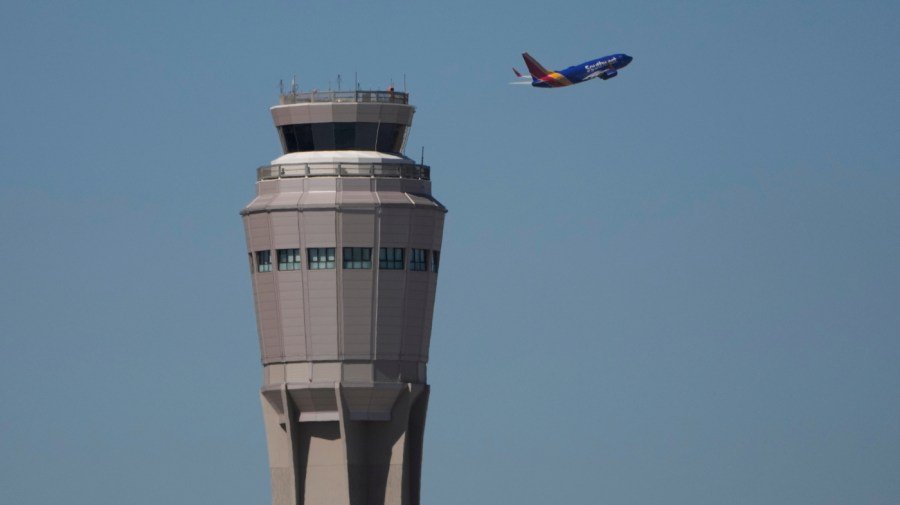Government shutdowns are harmful to the National Airspace System and weaken the U.S. economy. They are also stressful and distracting for the nearly 20,000 air traffic controllers and other aviation safety professionals represented by my organization — the National Air Traffic Controllers Association — the vast majority of whom work without pay during shutdowns.
As the current shutdown continues into its fourth week, these highly-skilled aviation safety professionals are bracing for their first missed paycheck today.
Every day, controllers ensure the safe and efficient movement of more than 45,000 flights, nearly 3 million passengers and approximately 60,000 tons of cargo across more than 29 million square miles of airspace. During the shutdown, controllers continue to show up and perform their safety-critical functions at the highest level despite operating 3,800 fully certified controllers short of the Federal Aviation Administration’s staffing target.
The controller workforce has been understaffed for more than a decade, resulting in mandatory overtime, including regular 10-hour days and six-day weeks. Last year, controllers at 40 percent of FAA facilities worked six days a week at least once per month. Several facilities require six-day workweeks every week.
The FAA and the National Air Traffic Controllers Association are acutely aware of these thin staffing margins and the compounding effects they have on controller stress and fatigue. That is why we strongly support Transportation Secretary Sean Duffy’s plan to expedite the hiring of controller trainees.
In fact, for the first time ever, Secretary Duffy directed the FAA to continue hiring and training controller candidates at the FAA’s Academy in Oklahoma City for the first two months of the shutdown. These measures will ensure that controller staffing is not negatively affected, unlike in previous shutdowns.
Even when the government is not shut down, because of the longstanding controller staffing shortage, an absence by just one ill controller has the potential to create significant staffing challenges at his or her facility. Moreover, because all airspace is interconnected, that one facility’s challenge can have a ripple effect across multiple neighboring facilities.
It is also important to understand that air traffic controllers are subject to some of the most stringent medical standards. The FAA deems as temporarily unable to perform their duties controllers who take such common over-the-counter medications as Benadryl and Tylenol PM. These strict medical standards continue to apply before, during and after the shutdown.
On Oct. 14, controllers received their first partial paycheck, which further increased their stress, not knowing when they would be paid again, introducing unnecessary risk into the National Airspace System.
Some of the lowest-paid controllers work in the highest-cost-of-living areas, while others live paycheck-to-paycheck trying to make ends meet. Instead of being completely focused on their jobs, these hard-working Americans now must deal with the stress of their jobs while also worrying about how to pay their bills.
Today, however, controllers will receive their first zero-dollar paycheck, or, as Duffy called it, “a big, fat zero.” No income. Nothing, all while they are working full-time and, more often than not, mandatory overtime.
These additional distractions will compound the existing risks in an already strained system. Every day the shutdown continues, the National Airspace System becomes less safe than it was the day before, as the controllers’ focus shifts from their critical safety tasks to their financial uncertainty.
Despite these challenges, the National Air Traffic Controllers Association is proud of its role as an aviation safety organization that stands shoulder-to-shoulder with Duffy, FAA Administrator Bryan Bedford, Congress, the administration and all industry stakeholders. We look forward to collaborating to ensure that the effects of the shutdown do not create lasting harm to the National Airspace System.
That is also why we continue to strongly support Duffy’s critical initiative to fully fund the modernization of FAA’s physical and technological infrastructure, so that the U.S. continues to be the gold standard for global aviation. Controllers play a critical role in the development, testing, training and implementation of new modernization and safety programs and they must continue to do so going forward.
The sooner this shutdown ends, the sooner we can all get back to advancing these shared goals. In the meantime, controllers will continue to show up to ensure the National Airspace System runs as safely and efficiently as possible.
Air traffic controllers did not start the shutdown, and they are not responsible for ending it. Our elected officials must act now to reopen the government and restore order.
Nick Daniels is president of the National Air Traffic Controllers Association.
